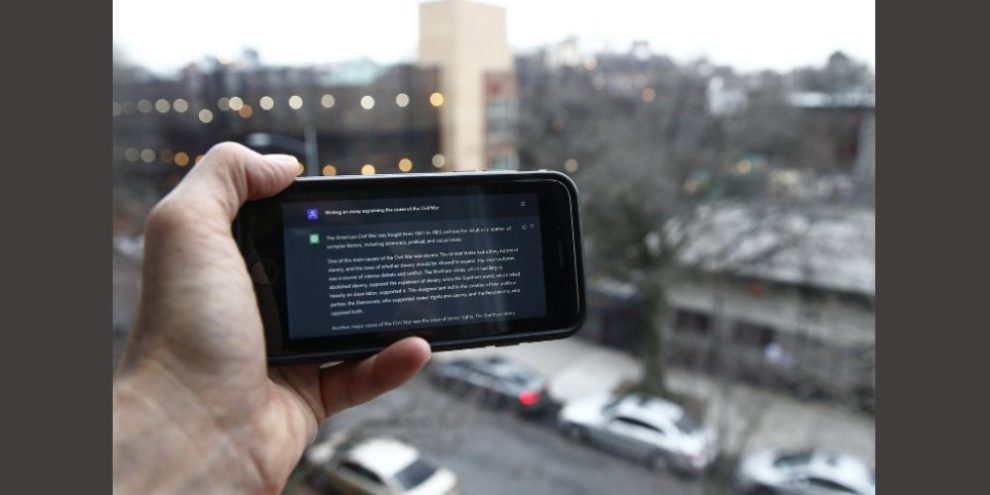
By Christian Collington in Toronto
Online chatbots capable of crafting academic essays are posing a quandary for Canadian universities struggling to clamp down on cheating while educating students about the limitations of using artificial intelligence.
Dave Cormier, a professor at the University of Windsor, says he is incorporating one of the most well-known tools, ChatGPT, into his classroom in a bid to teach students about its shortcomings and how to use it responsibly. He notes such programs will only get better and more prevalent.
“It’s out there, people are going to use it,” he says. “You might as well incorporate it and teach people how to use it ethically.”
ChatGPT, an artificial intelligence text generator developed by OpenAI and released in November 2022, quickly garnered widespread attention for its ability to produce ideas for song lyrics, poems and scripts. Among students, it's also being used to write essays.
ChatGPT is distinct for being able to generate fodder of varying expertise, ranging from high school to university-level compositions, while other online tools can correct grammar, tone and clarity.
Cormier, who teaches future educators different teaching methods, says he doesn't know if any students have used ChatGPT for his assignments, but says they did discuss the bot and similar tools in a recent class he led about cheating technologies.
He says it's very difficult to distinguish between an authentic paper and one written by the program, which provides a thesis, arguments and evidence without the user doing any research.
Students who use ChatGPT can further refine their paper by using other programs like Grammarly, which corrects spelling and grammar mistakes and assesses style and tone. And of course, students can also rewrite passages in their own voice.
“Change some words, run it through another checking system," says Cormier. "There’s really no way to win this fight right now.”
Sarah Elaine Eaton, an associate professor at the University of Calgary, says schools have to accept that AI tools are and will continue to be used. She is researching the impact of artificial intelligence on academic writing.
She says there are ethical ways for educators to use the technology in class — for example, by comparing the AI's writing to a student's and analyzing the strengths and weaknesses of using the tool.
“We understand that some educators and parents are a little apprehensive because they think that these tools might facilitate cheating somehow,” she says. “But there’s also an opportunity to help students learn in really exciting ways.”
She says a class could use ChatGPT to write an essay on the plot of "Hamlet" and then analyze the quality of what it spits out. They could also question the references used and whether the analysis was accurate. She says that would allow students to think critically on the effectiveness of the tool.
She also notes that ChatGPT does not produce a bibliography to go with the essays it writes — a red flag for professors trying to determine if a bot was involved. However she notes that there are online tools that can generate footnotes and sourcing for an existing paper.
Eaton, whose primary area of research is academic misconduct and cheating, says using AI tools is not necessarily cheating because it helps generate ideas.
She says schools are monitoring ChatGPT and other writing technologies before devising policies because as the technology evolves, there's potential to incorporate it into teaching and to research its potential uses.
“It’s really kind of a policy conundrum right now,” she says. “Most of the academic integrity policies in Canada and even around the world don’t have a lot of policy provisions for this.”
Rebecca Elming, a spokeswoman for the University of Waterloo, says unauthorized class use of bots like ChatGPT would violate the school's academic integrity policy, even though the rules don't specifically ban them.
Elming says an ad hoc committee is helping instructors devise assignments that are less vulnerable to AI cheating, and is also considering ways that AI tools can be incorporated into schoolwork.
Yanni Dagonas, York University's deputy spokesman, says the Toronto school will offer instructors a session on academic integrity and AI on Feb. 23 that includes advice on how to prevent cheating, such as clarifying test rules in advance and outlining resources that can't be used during a test.
He says some professors are curbing AI use by getting students to submit essay drafts and discuss their writing strategy with peers. Some professors ask students to proofread each other's work to increase collaboration and generate ideas with each other.
Cormier says he gets around the bot by assigning very specific essay questions a computer can't answer.
“When I teach, I’ll say ‘connected to the work we did in class today, give me your opinion about that thing,’” he says.
“It’s really about making it contextual to the classroom and making it personal to the student."
Cormier says an upcoming planning committee session for all faculty will discuss ChatGPT and the ways professors can deal with its potential use by students. He says the university does not have a policy on such tools.
“Talking about what we think the ethical use of these tools are can help faculty and I think it’s going to help students as well,” he says.
Lesley Wilton, an assistant professor at York University's faculty of education, says AI writing tools won't go away and will get more sophisticated over time. She says schools should allow them as long as students give proper credit when they're used.
"I think with ChatGPT we absolutely have to think about what it means to us as educators, what it means to our students and how to work alongside it," she says.
Banner image via The Canadian Press
This report by The Canadian Press was first published Jan. 20, 2023.






